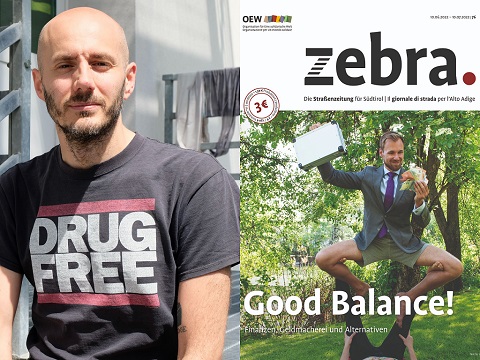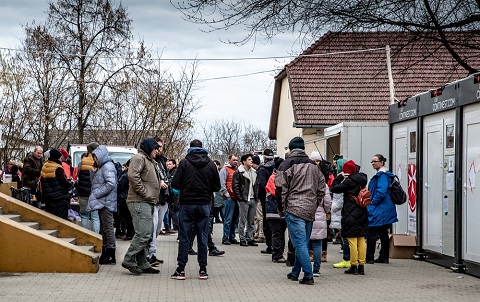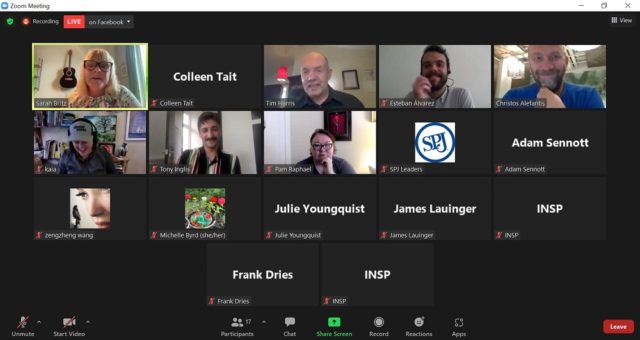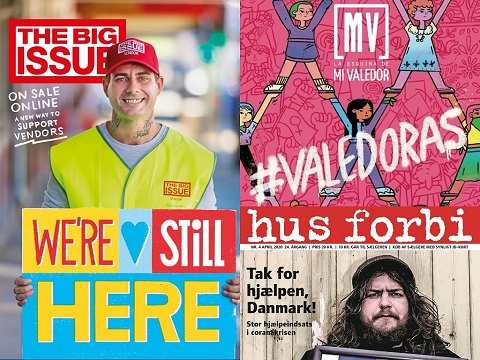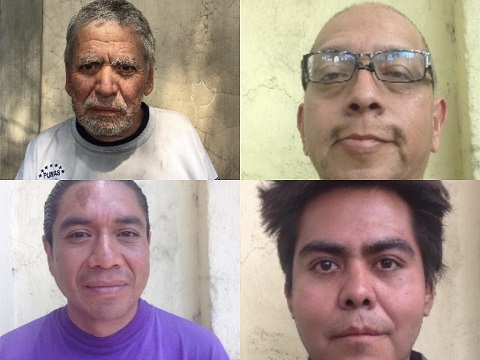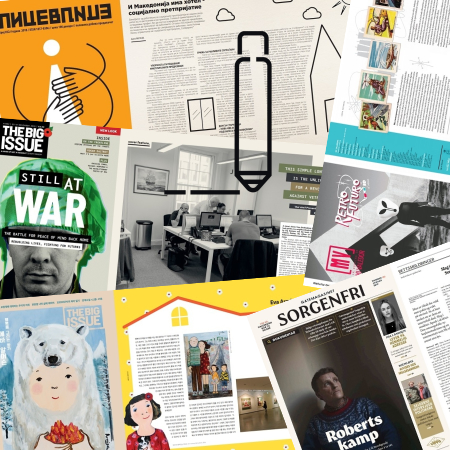By Alejandro Peña, Mi Valedor
Venezuela was a prosperous country, a Latin American promise. It received large numbers of European migrants during World War II, and over time it continued to welcome more people from other parts of the world. It was a perfect country in which to invest one’s hopes. Many foreigners settled there after starting their own businesses and over the years, they formed their own families and mixed with those born in that rich oil land, with its beautiful beaches, deserts, jungles, snow-capped mountains and extensive plains.
But then the dictatorship arrived. In the unforgettable December of 1999, as a result of democratic elections, a military regime with socialist ideas came to cling to power and vowed never to let go of it again. The president exiled private companies, humiliated and invalidated political opposition parties, closed media outlets that were critical of his administration, approved a new Constitution and created laws that favoured him, reformed the structure of the State, lengthened the presidential term and established the grounds for the indefinite re-election of winners of the popular election. He fought with international democratic organisations and automatically ignored their systems of norms and treaties, nationalised the country’s oil industry and ruined it – along with all the other companies that he expropriated – and seized all public institutions and subjected them to his political ideals. In addition, he generated a shortage of food and medicine typical of a country at war, gave weapons to the “collectives” (that is, criminal groups located in popular neighbourhoods) for them to use as so-called “protectors of the homeland” – which resulted in irreparable social chaos, devalued the currency several times and caused inflation levels of more than three percentage figures.
“As a consequence of the devastating conditions in the country, I – like many other Venezuelans – decided to emigrate.”
All of the above have combined to plunge Venezuela into a political, economic and social crisis that has been noted as being one of the most serious in modern history. Millions of Venezuelans struggle to eat one meal a day, while those who need medicine usually suffer without treatment. In July of last year, the Organization of American States (OAS) indicated that Venezuelan migration could reach seven million people in the coming year – even surpassing the exodus from Syria. It is thought that there are more than 6.7 million refugees who have fled the war that started in 2011.
The OAS has highlighted five factors that have driven Venezuelans to flee their country:
- A complex humanitarian emergency: United Nations data indicates that one out of every three Venezuelans faces starvation conditions.
- Human rights violations: the OAS General Secretary indicated that they have identified 18,093 extrajudicial executions carried out by state security forces or groups since 2014.
- Widespread violence: the country is also plagued by crime and criminal gangs. The Venezuelan Observatory of Violence affirms that Caracas is the most violent city in South America.
- Collapse of public services: Venezuelans experience daily cuts in electricity and water services. The Blackout Victims Committee confirms that in 2020 there were 157,719 blackouts across the country. Furthermore, 92 per cent of households in Venezuela do not receive water regularly.
- Economic collapse: according to the International Monetary Fund, Venezuela is the country with the highest inflation in the world (6,500 per cent).
As a consequence of the devastating conditions in the country, I – like many other Venezuelans – decided to emigrate. Perhaps my story is similar to that of many of my compatriots in exile.
One day, desperate and overwhelmed, I decided to buy passage by land to Ecuador, where one of my cousins lives. I asked him if he felt good there, and he said yes. That was enough for me. Anguish leads you to make hasty decisions. In the space of just a week, I put some of my belongings in two large suitcases and one small one. I was simultaneously packing up my former life and imagining my future as I arranged belongings in the suitcases: memories of happy moments, of friends and of trips jostled with my many dreams for the future.
On the day of my departure I went, with my soul numb, to the bus terminal. My mom accompanied me. Neither of us cried as I prepared to leave. I was worried about the details of the trip and wanted to get on the road as soon as possible; I wanted to leave the country in ruins that made me feel sadder and sadder as time went by. When the bus left, I saw my mother through the window – her face was running with tears. I began to cry too, unable to contain myself. At that moment, I realized that I was traveling into the unknown, and that I did not know when I would see my family, my friends and my country again.
The next day, we reached the territorial limit that separates Venezuela from Colombia, and because the Venezuelan regime has closed this route to vehicles, it is mandatory to cross on foot. We got off the bus with our luggage and walked over the Simón Bolívar bridge, the meeting point between the two nations, and boarded another bus. There were hundreds of Venezuelans emigrating alongside me. In the middle of the bridge, I turned my head and took one last look at the land where I was born. “See you soon, Venezuela,” I said to myself – without being very sure of when I would ever see my country again.
Thus began my adventure full of sorrows and triumphs. I have experienced many sadnesses, but also joys. I have met good and bad people along the way and had my share of disappointments and surprises. But above all, I have felt an enduring melancholy when I think about Venezuela. You carry your country inside you, and it will always be with you wherever you go.
After living for two months in Ecuador and for two years in Peru, I decided to make my way to Mexico. It is a country that has always fired my imagination. I had dreamed of visiting Mexico since I was young: its cultural richness fascinated me, its history as the cradle of the Aztec and Mayan empires seemed wonderful to me and its film productions from the mid-20th century were a source of delight for me. In short, Mexico was always a dream destination for me – but the younger me would not have imagined that I would flee there while escaping from a humanitarian crisis in my home country.
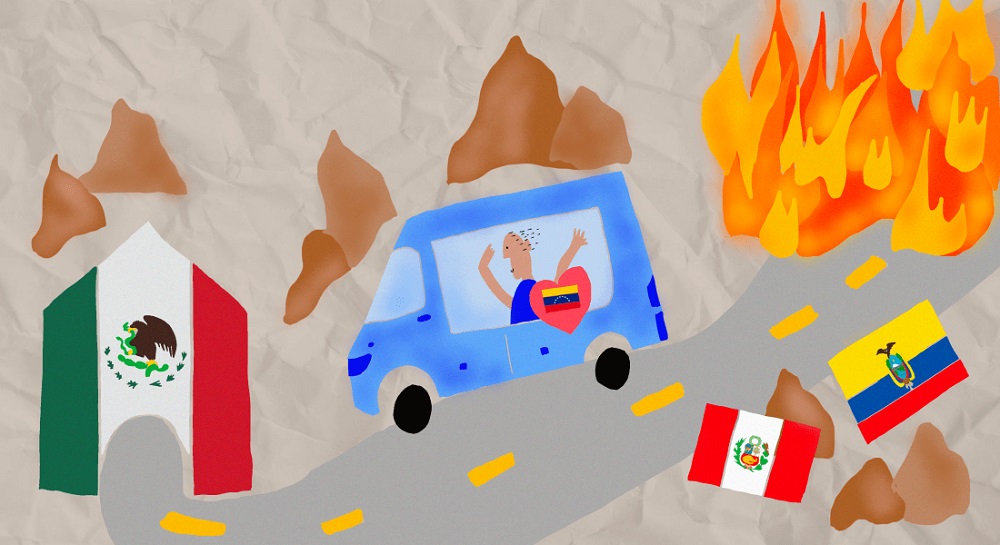
Upon landing in Mexico City, I was full of dreams, plans and ideas. I was also a bit tired of not having a fixed place to live; of not having a home and of feeling adrift. And with Venezuela always in my thoughts, I was feeling more and more depressed and exhausted.
I rented a room with the help of a friend and started the immigration process the next morning. I was worried about it. Although I had informed myself of the process well before arriving and had knowledge of a good part of the process as a result, doubts and fears always arise in the face of possible obstacles.
First, I had to go to the Mexican Commission for Aid to Refugees (COMAR). I read that it was necessary to arrive very early, so at six in the morning I was already there, waiting with others outside the building until they allowed us to enter. Every day, COMAR attends to large groups of foreigners who come to request refuge. I saw people from Central America, Cuba and Haiti, along with other Venezuelans. All of us were impatient and nervous.
Upon entering their facilities, COMAR workers placed us in an area on the first floor, where they serve first-time visitors. There, they explained to us the rights that we had as refugee claimants and also the requirements that we had to fulfil and what would happen if we did not fulfil them. Foreigners who did not speak Spanish were served by bilingual or polyglot employees.
We gave them our passports, our proof of legal entry to the country and a simple form with some basic information, and then they asked us to go one by one into a small office where a COMAR worker asked us detailed questions about our particular cases.
After a few hours, they informed us who could start the refugee application process. That day almost all of us were accepted, except for two cases in which the applicants did not comply with the requirements for claiming refugee status.
At that moment I felt a great sense of relief. That first step meant a lot to me. When you are a migrant, you realize how important it is to have papers. Every procedure, no matter how basic, requires identification that certifies your legal stay in that country. Without papers, it’s like you don’t exist.
That same day they also gave us the CURP; that is, our Unique Population Registration Code, which in Mexico is an alphanumeric code with which all people residing in the country, both nationals and foreigners, are registered. We were all pleasantly surprised; it showed on all of our faces. It is important to mention that a great advantage of this process is that it is completely free. This point is emphasized from the moment you arrive at COMAR in order to protect refugees from falling victim to scams.
The next step was to go to The National Institute of Migration (INM). There, after meeting several basic requirements, I applied for temporary residence while they processed my refugee application at COMAR, which was a process that could take a few months.
If you meet all the requirements to claim refugee status, you are given a small green card with your personal information and a short legend that says “temporary residence” after a few days. I felt joy when I finally held it in my hands: everything was progressing as I had hoped. That small green card allowed me to work legally in the country.
After being awarded this documentation, I had a personal interview at COMAR with an expert on humanitarian issues. There, they asked me in a more detailed way about my personal history and my reasons for requesting refuge in Mexico. In addition, they asked me for proof (if I had any) of the danger I was running away from in my country and for my reasons as to why I felt that my safety would be threatened if I returned. I had my answers ready. Many people get nervous about this interview because it is based on this that the decision is made as to whether their refugee application is approved or not. The important thing is to tell the truth.
“Anguish leads you to make hasty decisions. In the space of just a week, I put some of my belongings in two large suitcases and one small one. I was simultaneously packing up my former life and imagining my future as I arranged belongings in the suitcases: memories of happy moments, of friends and of trips jostled with my many dreams for the future.”
After that interview, I had to wait for COMAR to contact me with the request to return and hear their answer in person. They called me after three months. The day I went I was anxious. I guess it’s normal; after all, what they were about to tell me would determine the course of my future.
As I waited, my thoughts swirled uncontrollably around in my head. I visualized what my remaining options were should the answer be negative. Nerves are like that; they make you ponder desolate scenarios.
Several minutes passed before the same specialist who interviewed me appeared and directed me to enter a small office. I wanted to appear outwardly calm; inside, I was desperately hoping for my refugee claim to be approved. Moving from country to country looking for a “normal” life is not easy, and over time you wear yourself out emotionally.
After a few brief introductory words that I hardly heard because my mind was racing, the specialist finally got to the decisive part: “The Mexican Commission for Refugee Aid [has] as approved your refugee application.” He said it so quickly that I hardly believed him. I felt as though my soul had returned to my body. I felt immense gratitude; I think I said thank you several times in a row. I remember it as being a sunny day, but even if it had been cloudy, it would still look bright to me as I look back. I walked out with a smile on my face that emanated from the deepest part of my being.
That same day, COMAR gave me a sheet attesting to the fact that I was welcome in Mexico as a refugee. With that document in hand, I went to the INM to submit an application to change my immigration status from temporary residence to permanent residence. It is necessary to wait a while for your request to be processed. We were at the start of the pandemic back then, but everything was still working as normally as possible and in less than half an hour I had my new card that proclaimed I was a permanent resident. At last! My immigration process had been completed successfully and in less time than I imagined!
After recounting the entire process, I can honestly say that it was quite efficient and swift. I was always treated well, both at COMAR and at the INM. Each step along the way took the exact amount of time that I was told it would take, and any questions that arose were immediately answered. I even received financial aid and food supplies at the COMAR facilities. That was quite a surprise for me.
I am very grateful to Mexico for welcoming me with open arms. It is a vast and diverse country that can be a little intimidating at times but it is definitely a land full of wonders.
Courtesy of Mi Valedor






